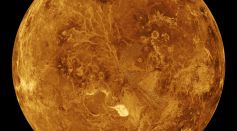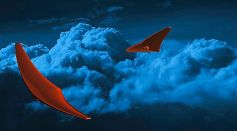Tags: Venus
Here's a Look At November's Stargazing Events
Russia Declares Venus a Russian Planet

Phosphine in the Atmosphere of Venus Could be Sign of Life

Gigantic Wave of Poisonous Tsunami Captured Crossing Across Venus
9 Must-See Stargazing Events in August, No Telescope Required!
Five Planets Will Be Visible This Sunday Along with a Crescent Moon: How To See Them Without a Telescope

Venus Will Be At Its Brightest This Week: Here's How You Can See It
The Truth Behind the Smiley Face Venus, Jupiter and the Moon Will Form on May 16

Researchers Confirm Volcanic Activity in Venus Through Light Emissions
Venus-Jupiter Conjunction Can Be Experienced All Throughout the Week

Stingray-Shaped Spacecraft to Probe Venus
Space Agencies Cannot Resist Venus’ Pull
Life On Venus: Could It Be True?
Researchers Solved The Mystery Behind Venus’ Few Rare Volcanoes
NASA Plans To Send Out A Crewed Mission To Venus To Understand Climate Change On Earth
NASA Set To Send A Mission To Venus As Preparation For A Man Exploration In Mars
Venus’ Rocky Exoplanet Twin Discovered Near Dim Home Star; Key to Finding Other Habitable Planets?
Jupiter Will Make The April Night Sky The Brightest Than Venus
The Mystery Of Venus's Atmosphere Solved By Meridional Circulation & Doppler Shift
Five-Planet Alignment To Light Up The Morning Sky
Most Popular

Will Earth's Magnetic Poles Flip Next? Magnetic Pole Reversal Explained Through Cutting‑Edge Magnetosphere Science

Relativity Time Dilation Explained: The Physics of Time and Why It Moves Differently in Space

How Lightning Science Reveals Why Charged Storms Are Rising with Global Warming Effects

How AI Is Used in Weather Prediction: Smarter Forecasting Through Machine Learning





